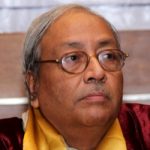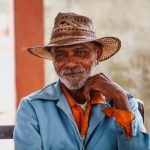There cannot be any prescriptive suggestions for habits of “happy seniors” as these might vary across individuals. However, there are certain common denominators that every senior must develop as habits so that they can remain happy while they age.
7 Habits of Highly Effective People authored by Stephen Covey first published in 1989 still continues to be one of the best sellers of all times as a helpful guide for people trying to be effective and successful in their lives, both professional as well as personal. It contains narration of simple yet very meaningful 7 habits that each individual must inculcate to be successful in life.
Some of those habits do have significance for elders too; but the meaning of “effectiveness” slightly differs at old age compared to younger period of life. The word effectiveness may also need to be changed to “happiness” as elders for their remaining life need to happy as they age and reach terminal stage of their lives.
There cannot be any prescriptive suggestions for habits of “happy seniors” as these might vary across individuals. However, there are certain common denominators that every senior must develop as habits so that they can remain happy while they age.
7 Habits of Happy Seniors:
It is under the above scenario that the 7 habits are proposed so that an optimum practice of them may make life of an elderly person better and they may lead a happier life amidst all difficulties.
- Practice a daily routine
- Find a purpose of life & follow it
- Find a friend
- Remain calm
- Keep learning
- Develop sense of detachment
- Be spiritual
Practice a daily routine:
This is the starting point as many elders find no specific relevance to timings of a day as they used to while they were younger. They had a set pattern of life: getting up, doing exercise, moving to work life, be with children / family, enjoy holidays and so on. Loss of many of these inducements prompts a senior not to follow a set pattern of daily routine. The first and most important starting habit is that elders must follow a definite & set schedule of daily routine. This will help them physically and mentally active to do certain things at specific timing of the day and thereby keep their mental clock clicking. This includes habit of eating food in time and doing regular exercises.
Find a purpose of life & follow it:
This is another important aspect. Many elders find no relevance for them in life as they feel they have no more use in family or society. They lose purpose of life as if everything seems to be over. Proper qualification, decent job, good family, upbringing of children: all these purposes seem to be over and they find in desperate position. The 2nd most important aspect of habit is to find a new purpose of life and live for it. It can be anything: from living for society to spending time for themselves. Finding a purpose and doing something actively to achieve the same is the other habit elders must try to develop.
Find a friend:
One of the difficulties of old age is that we seem to lose all our old acquaintances starting from family to ex-office colleagues. Children are all grown and busy in their own lives. Old fiends might be somewhere else and no more in touch. Hence the only way to move forward is to increase the “locus of contact” by being in new social circles and making new friends. It could be a group / club or new friends in housing society or somewhere else. Remaining socially active is key to healthy living and hence this habit might help.
Remain calm:
Old age is bound to see adversities and pain points of life. One may become physically ill, there may be bereavement of close family members or friends. This news will often come and tend to disturb the mental balance and peace. No doubts these are disturbing news and will tilt the mental peace. Elders should, however, need to develop habit of remining calm in face of these adversities. Treat them as events of life, and move on. A balanced emotional quotient (EQ) and a strong resilience quotient (RQ) are the two traits each elder must try to develop to face the waves of life and still be calm. Sense of positivity is at the core of it all.
Keep learning:
The moment we abandon propensity of learning new things, we lose relevance. This quite often happens with many elders; they do not want to learn anything new and hence start withdrawing. To keep mentally active, we must keep on learning till we die. It could be new technology, novel hobbies, exploring new places, or anything that is unique. This habit is key to move forward.
Develop sense of detachment:
Attachment is the root cause of many problems in life. We are attached to all types of tangible & intangible assets and that gives rise to emotions of love & bondage. At old age, we start losing some of these assets like a close friend or a house or physical disability and that results in depression emanating from a sense of helplessness. To overcome this emotional aspect, elders must try to develop a sense of detachment from all types of earthly pleasures / assets / emotional slavery and that by itself will make us better. The principle of older age living should be to “enjoy life with all its beauties but with a sense of detachment”.
Be spiritual:
This is a feeling that must dawn on the minds of all elders; life is a journey and not destination. We are only partaking an insignificant portion of the magnanimous universe and we are mere travelers & have to descend one day or the other. Once this philosophy descends, we will be inward looking and spiritually oriented. We may not get all answers to our questions but will be happy to be part of this magnificent universe journey by being born as “human being”. Elders must learn to live with this “contour of spirituality”, if they are to enjoy life.
Way Forward:
Habit is defined as a practice or way of life. Once we start practicing them, they become integral part of our lives. The 7 habits described above are important practices on part of elders so that they can live a useful and happy life. This is also at the core of happy aging. Some of them might appear philosophical and difficult ab initio, but a conscious way to develop and practice them will make life happier. Elders may find meaning in life which otherwise might seem dry.
Author Bio

Dr A K Sen Gupta is the Co-Founder and Chief Trustee of My Retired Life Foundation (MRLF). This article has been published in Free Press Journal (FPJ) on 30th October 2022, where he is a regular contributor. Dr Sen Gupta was the Director of S.P. Jain Institute of Management & Research, Mumbai, and Director & Mentor at SIES College of Management Studies, Navi Mumbai. He was a World Bank Consultant and instrumental in setting up the National Banking College in Ghana, Africa, and a Professor at the National Institute of Bank Management, Pune.





Very well said 👏 👍